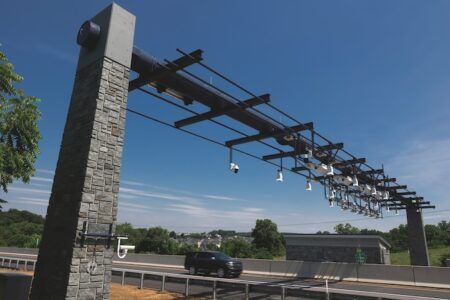Responding to a government consultation on reforming the Heavy Goods Vehicle (HGV) Road User Levy, the UK’s Intelligent Transport Society has told the Department for Transport (DfT) that there is no technical barrier to distance-based charging for trucks.
A wide-ranging group of respected experts from ITS UK’s Road User Charging Interest Group has agreed that the technology required for a distance-based charging system already exists, with Germany having operated a successful truck tolling scheme since 2005.
Options for technology range from automatic license plate recognition (ALPR) or RFID (radio frequency identification) toll tags, to a solution based on an onboard tolling unit or the use of a GPS-enabled telematics ‘dongle’ plugged into the vehicle’s onboard diagnostic port.
The ITS UK experts have also advised on the privacy issues surrounding any use of location-based charging, and although it was agreed that this is less of an issue for freight carriers than it would be for private drivers, there still needs to be mechanisms in place to allay any fears.
The organization’s report to the DfT also includes comments on the effects of charging on congestion, vehicle emissions and the country’s economy, and is being submitted following the Department’s call for evidence on reforming the existing HGV Road User Levy, which was issued in November 2017.
ITS UK’s president, Steven Norris, is a vocal supporter of road user charging (RUC) and agrees that the technology is now mature enough to support it. “When I was transport minister in the 1990s, it was easy for road user charging to get kicked into the long grass because the infrastructure costs were prohibitive. There is now no such excuse, and any decision is purely a political one,” observed Norris.
ITS UK’s secretary general, Jennie Martin, added, “This is a very important issue for the future of mobility and I’m proud that ITS UK has again been able to help set out the options in an informed way; it’s another example of the service we give to members and, by implication, to the wider travelling public.”




